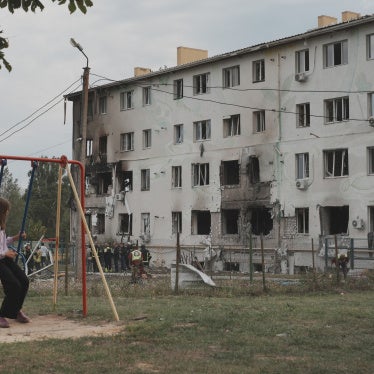About forty women gathered today outside the Tashkent mayor's office to protest the illegal arrest and incarceration of their male family members
"We are here today to get our relatives released," one woman told Human Rights Watch. Another added, "Our children are in prison, but they are not criminals, they are not thieves, they just read ‘namaz' [the Muslim five daily prayers]."
A busload of police arrived on the scene as the women approached the entrance to the mayor's office. Approximately 15 officers—including uniformed police and several soldiers in camouflage surrounded the women—along with at least six officials from the mayor's office. The officials refused to grant the women's request for an audience with the mayor, advising them to return another day with a written appeal. After about 40 minutes of discussion, officials disbanded the demonstration and escorted the women away from the government building.
Representatives from an international organization who arrived on the scene as the women were being disbanded reported that plain clothes officers presumed to be from the National Security Service (SNB, formerly the KGB) followed several of the women as they descended into a nearby metro station. A Human Rights Watch representative who witnessed the protest noted that police and officials from the mayor's office attempted to take down the names of the protesters. They reportedly succeeded in videotaping all of those gathered. In past years, such police video recordings of demonstrations have allegedly been used to locate participants, who were later arrested on charges of anti-state activity or called in for questioning about their political views.
The women came to appeal to local government officials on behalf of their relatives, who are religious Muslims arrested during the past sixth months on allegedly fabricated charges of narcotics and weapons possession and also for alleged possession of leaflets produced by the unregistered Islamic group Hizb-ut-Tahrir. Regardless of the justification for their original detention or arrest, the men were all charged with violating article 159 of the criminal code (encroachment upon the constitutional order of the Republic of Uzbekistan). Some received prison sentences ranging from eight to ten years.
The situation for those in pre-trial detention appeared particularly precarious. One woman reported that her husband, detained two months ago, is still missing in police custody. Others related similar accounts, and said they were searching desperately for their missing relatives.
Many of the women complained also of the harsh conditions they are forced to live under while their husbands, brothers, and sons are in prison. One 46-year-old woman described the economic hardship brought on by the absence of male family members: "My husband died, my son has been arrested and now we have two women in the house and four children. How can we live? We eat only bread, we don't have meat or butter." A 50-year-old woman described how police put her under administrative arrest for 15 days because of her inability to pay rent after her husband went to prison.
The last known protest of this scale in Tashkent was held in January 1998, when about 100 female relatives of men detained and arrested because of their religious affiliation gathered outside a Tashkent police station to demand the immediate release of their male family members. That protest was dispersed by police, who detained several of the women and levied fines against the alleged organizers of the demonstration.
For more information on Uzbekistan, visit https://www.hrw.org/campaigns/cenasia/uzbekistan.shtml
For Further Information:
In Tashkent, Acacia Shields: +99871-130-61-02
In New York, Rachel Denber: +1-212-216-1266







